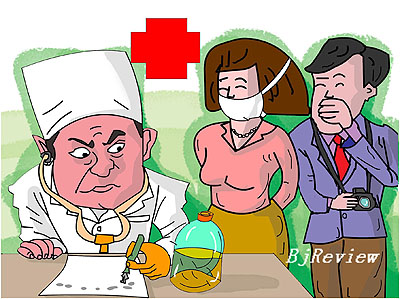
Substituting tea for urine samples has sparked off more than just a storm in a teacup. Hospitals in Hangzhou, Zhejiang Province, were recently left red-faced when they tested tea and pronounced prescriptions to treat ailments related to the samples.
With China already in the grips of public dissatisfaction over hospitals and their services, this “scandal” has added fuel to the fire. Journalists from China News Service, the country’s second largest news agency, duped 10 hospitals in the Zhejiang provincial capital in late March, by passing off tea as urine specimens for health test analyses. In just two days, six of the hospitals concluded that they found blood cells in the “urine” samples, and five of these gave prescriptions for treatment, costing around 1,300 yuan in total.
Cheng Qikun, a renowned chemical expert, said it’s impossible for tea to be found positive of infection or even to contain blood cells.
When the “infected” tea story was released on the China News Service’s website, it caused a national outrage eliciting thousands of comments. Some criticized the irresponsible doctors for their malpractice and negligence, while others accused the journalists of abusing their power to report and contravening the code of ethics as it applies to the profession.
Doctors were quick to respond and close ranks. At an online community for young medical workers, doctors from Beijing’s prestigious Peking Union Medical College Hospital and China-Japan Friendship Hospital, in joint efforts with colleagues from another 92 top hospitals throughout the country, organized medical tests specifically for the “tea-urine.” After three days 136 valid testing reports were collected, of which 93.4 percent or 127 showed a “positive” result for bacterial infection.
Medical professionals argued by explaining that lab tests can be fooled. The blood cells found might indicate the chemical elements produced by redox in the tea. Hydroxybenzene and other organic matter can easily react with elements contained in the indicator of litmus paper that can give positive results indicating an ailment. And the tests will detect the same chemical elements in any liquid whether it is urine or tea. Usually, doctors believe that patients are bona fide and won’t suspect that they are pretending to be ill, they said.
The argument intensified when China’s Ministry of Health stepped in. Spokesman Mao Qun’an said the reporters’ tactics had disrupted the test procedures in hospitals and their reports had misled the public. At a regular news conference in April, Mao criticized their behavior, adding that their methods went against journalistic ethics, and undermined the doctor-patient relationship.
Media are at fault
Ren Yunfei (www.scol.com.cn): What happened is unfair to the hospitals and doctors concerned. The testing equipment will deliver a result from samples, no matter what it is, tea or urine. And of course, whatever it is, the selected hospitals emerge looking like they have been trapped.
People who submit their urine samples, in most cases, are those who are suspected of having an infection and do so in the hope of knowing what they are suffering from. The tea, which doctors found to be positive for blood samples, would never give the right answer.
The media is endowed with the power to supervise the medical system to ensure a more harmonious relationship between doctors and patients. However, media supervision can be a double-edged sword and, if it is not properly used, can easily lead to chaos.
Bai Jianfeng (People’s Daily): The journalists provided a false medical record, from which doctors made the final drug prescription, based on the test results. Contrary to the principle of being innocent until proven guilty, in this case the doctors were presumed guilty. Every visitor to a doctor should firstly be regarded as a “patient,” and the feelings of patients are particularly important when doctors are deciding on treatment.
News reporting demands authenticity, comprehensiveness, impartiality and fairness. It is the exception rather than the rule that reporters attempt to manufacture sensational news events. Also, such a ridiculous “incident” will possibly worsen doctor-patient relations and damage the reputation of doctors.
The ultimate goal for media supervision is to uncover the truth and find solutions for problems to benefit the public as a whole. That is the reason why reporting should also be fair and just, which requires a sense of responsibility from the media to maintain its public credibility and trust.
Mei Hao (www.dahe.cn): Medical equipment is used in the testing of urine samples. Medical tests of tea in a laboratory can be a scientific research initiative, through which innovation and improvement of such equipment can perhaps be achieved. But it is impossible to use tea in authentic medical procedures, and by doing so it will only cause misunderstandings.
| 